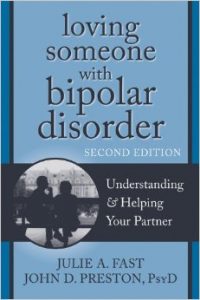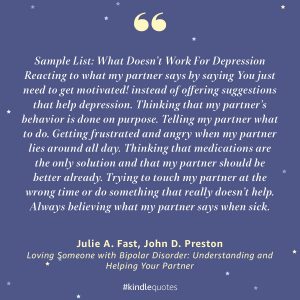Is Depression Affecting Your Work? Here’s Why You’re Not Alone
It’s difficult to get things done when you’re depressed. Julie A. Fast shares some personal advice on working through bipolar depression to get things done.

Originally published in BP Magazine.
There’s no question it’s difficult to get things done when you’re depressed. I’ve certainly had a hard time with this for most of my life. I had plenty of ideas for my books and other writings and I knew I had the talent. But when it came to finding the energy to get started and follow through to the end, I just couldn’t seem to accomplish what I wanted to.
The process was overwhelming and I stopped believing in myself. Then one day, I realized that all people with depression have trouble getting things done. It’s a symptom of the illness, not a personal flaw. From that point forward, I made a decision to do everything possible to get things done as best I could. No longer would I look back on my life and feel ashamed for all the time I had spent worrying about my lack of accomplishment, instead of doing something about it.
Take control of your depression
I became very ill about 10 years ago and spent a lot of time in bed. I couldn’t focus and could barely take care of the chores around my apartment. I cried all the time and felt like I would be a “failure” forever. It took me a few years of living this way before I realized that I had far more control than I realized over the depression ruining my life. I knew I had to make some big changes, if I didn’t want to live like a walking zombie.
So I decided to take control of my life, rather than let depression dictate what I could and could not do. Instead, I said to myself, “Depression may not want me to get on with my day, but I do.” And I was finally able to get out of bed—I did have control over my body.
It often felt as if I was walking in mud the minute I got up (and it still does today). However, I made a decision and stuck to it. When I felt too depressed to work on a project, I reminded myself, “I have control here. I make my decisions.” And this helped me change the way depression affected my life. My point is that even in the darkest depression when you feel immobile, you are not immobile. You can still move your body and you can make your own decisions.
The work-time: worry-time ratio
As I looked more deeply into the reasons why I wasn’t able to get things done, I realized that the time I spent worrying about not doing something took far more time than the actual task. I still struggle with this dichotomy today. Just last week, for instance, I was being really hard on myself for not answering all my email. I finally made myself sit down and take care of the problem. It took 45 minutes! I literally worried for a week over something that, in fact, took less than an hour.
This happens to me with household work as well. Did you know it takes about three minutes to unload a dishwasher and maybe a half hour to clean the whole kitchen? Worrying really does blow a job completely out of proportion. Just reminding myself that I’d rather get a small job done—instead of worrying about it—makes all the difference.
Waiting until you want to do something
Many people equate depression with the inability to work. In reality, it’s often the inability to feel like working that is the problem. Waiting until I “got” the feeling of wanting to do something before I even got started was one of my biggest mistakes. I’ve always thought that depression made it impossible for me to get things done—that my lack of desire to finish projects was a personal failing. I really believed this when it came to writing and other creative endeavors. It’s so sad to think of all the years of creativity I lost because of these thoughts.
These days, I know that I don’t have to feel like working in order to get started or to finish a project. The desire to keep working may not be very strong, but it does show up eventually. I say to myself, “Julie, the longer you wait to want to do this, the more chances it will never get done. Do it now. There are no other options.”
Be kind to yourself
I recently had stomach surgery. Everyone was very concerned and often told me not to do so much. My friends and family came over and helped with cleaning and drove me around town. They said, “You have to take care of yourself, Julie, so that you can heal properly!” I agreed and although I felt that I was being a wimp for needing so much help, it was easy for me to accept that my body had limitations I needed to respect. The real irony is that my depression is far worse than any stomach surgery—it’s more dangerous and takes a lot more management. This is the stigma of depression, when in reality it’s just as physically significant as trauma to the body. I took care of my physical body following the surgery. Likewise, I know that I need to be just as good to myself when depression is making it hard for me to function.
Let the real you take over
I try to use all these tools in my daily life. I still have the depression most of the time, but I accept that this is how it is for me. If I want to finish a project, I will have to rise above the depression and let the “real me” take over. My last book, Take Charge of Bipolar Disorder, took six months to write. On the days I could barely get started, I reminded myself that I didn’t have to like what I was doing, but I was going to do it anyway.
The time I spent worrying about not doing something took far more time than the actual task.
On some days, I cried while I was writing. On others, I was sure the depression was going to do me in, but I kept going. I really did say to myself, “Julie, the depression wants you to be sick today, but you’re a professional and you can finish this book.” And I met my deadlines. The most interesting thing is that when I look at the book now, I honestly can’t tell what part was written when I was severely depressed, and what part was written when I felt stable. I definitely still have days when I sit around and get really down on myself. These days are really tough, but I have the goal to at least be more active by the evening—it usually works. I have taught myself that depression will always take away my ability to get things done, if I let it.
I’ve decided not to let it anymore.
* * * * *
Tips for getting things done:
- Work with a friend.
- Choose the best work space for you.
- Work on one project until it is finished.
- Remind yourself that depression is involved—you are not weak or lazy.
- Feel the depression and do it anyway.
- Don’t give up. Change takes time.
Julie’s book Get it Done When You’re Depressed: 50 Strategies for Keeping Your Life on Track is available on Amazon.













